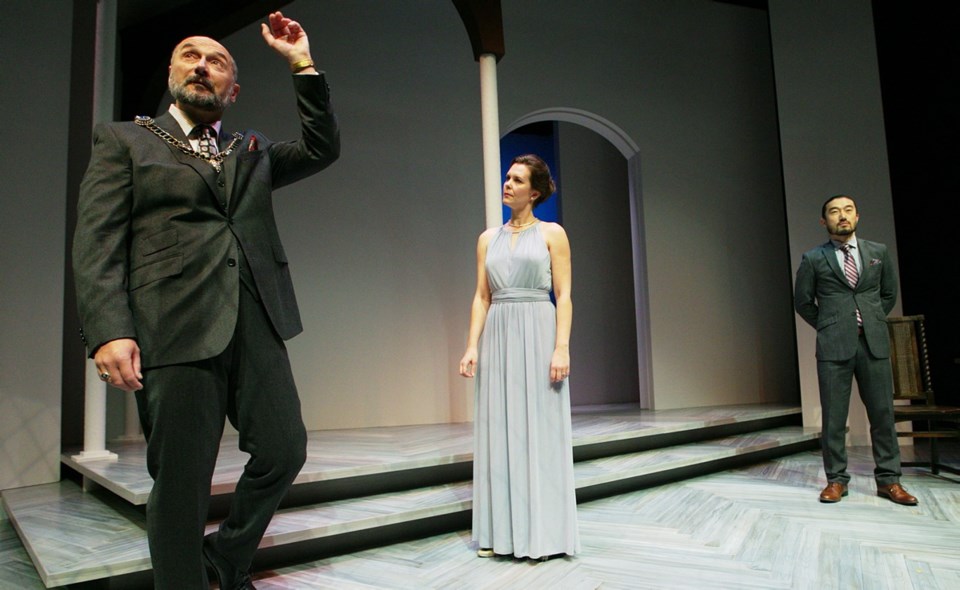PREVIEW
What: The Last Wife
Where: Belfry Theatre
When: Opens tonight, 7:30
Tickets: $20 to $53 (250-385-6815)
Because she lived a less melodramatic life than King Henry VIII’s other wives (for starters, she wasn’t beheaded) we don’t hear as much about Catherine Parr.
Stratford playwright/actor Kate Hennig aims to change all that with The Last Wife, opening tonight at the Belfry Theatre. Her play, a drama with comedic touches, examines Parr’s 16th-century marriage to Henry. In particular, it focuses on the dilemma of being an educated, independent woman paired off with one of history’s most outrageous misogynists.
“I thought, why is [Parr] so much in the shadow of her husband? So I wanted to just pull her out of the shadows,” Hennig said this week from home in Stratford.
The Last Wife recently emerged as one of Canada’s hot new plays. It had its world première last year at the Stratford Festival, earning plaudits for its vivacity and wit. This was all the more impressive, since it was the first time Hennig, a veteran actor almost unknown as a dramatist, has had a major production of one of her plays.
Last Friday, The Last Wife was shortlisted as best new play by the Playwrights Guild of Canada. This second production, staged with Ottawa’s Great Canadian Theatre Company, is directed by Esther Jun and stars Celine Stubel as Catherine Parr — or “Kate” as she’s identified in the play.
In the play, an aging King Henry is approaching the fag-end of his career, struggling with a leg wound that refuses to heal.
Kate, a young widow, enters marriage while juggling a circus-act’s worth of complications.
She has a lover on the side. She’s bent on having Henry recognize his daughters Mary and Elizabeth (Bess) as legitimate successors to the throne. As well, determined to have a say in national politics (she silver-tongues Henry into appointing her regent while he goes on campaign), Kate struggles to balance ambition with the king’s worrying proclivity for having bothersome wives executed.
Hennig says she got the idea of The Last Wife in 2011. She was watching news reports about the Arab Spring, a wave of anti-government protests and rebellions in the Middle East.
“I was curious where the women are behind the men in power in these despotic political situations,” she said.
Although creatively inspired, Hennig felt unqualified to write a play about that situation. So she decided to write about what she knows.
Until recently, she was best known as a career actor of 35 years; her credits include Billy Elliot the Musical on Broadway and many roles at the Stratford Festival. So Hennig, whose resumé also includes such Shakespeare history plays as Henry IV and Henry V, turned to familiar ground: England’s royal past.
Catherine Parr especially appealed to her. She was brainy, dynamic proto-feminist who was the first queen to publish in English under her own name. Parr is said to have exerted a strong influence on the country’s politics, particularly in matters of religion.
One review of The Last Wife cheekily dubbed the character of Parr as a “feminist superhero.” Laughing when this was mentioned, Hennig embraced the description proudly.
“I go, yeah, so why can’t I draw a feminist superhero? Why can’t I make her a bit larger than life and suit my political purposes, in the same way Shakespeare had his characters suit his political purposes?”
The Belfry production will feature contemporary dress and a modern-day set with a few Tudor flourishes. It’s in keeping with Hennig’s approach. Her characters converse like 21st-century folk, sometimes employing present-day slang.
“I wanted it to be in the vernacular, current language. So that people can see themselves in these relationships, as well. So we can see our own struggles that continue to go on with feminism, even though it’s 500 years later,” Hennig said.
The playwright wanted to show the royals as real people whose power struggles are as relevant today as then.
“Those people were humans as well,” she said. “Even though we make them icons.”
The Last Wife has been praised as an astonishingly mature work for a novice dramatist (this isn’t quite true, as Hennig has been writing plays for a dozen years). Her decades of acting experience help. Her empathy for the acting profession makes her determined to make every role, no matter how small, as rich and complex as possible.
“Because I’m an actor, I look at every single part in the play as if it’s something I would want to play. A part that I would want to be cast in. So no one gets left out. I want them to have something really meaty and interesting to play.”
Hennig views The Last Wife as part of series she calls The Queenmaker Trilogy. The next play, The Virgin Trial, will be the story of “Bess,” who later became Queen Elizabeth I. It will première next year at the Stratford Festival.
Hennig said she’s still trying to wrap her head about the fact The Last Wife made its debut at Stratford.
“It was,” she said, “a pinch-me moment.”



